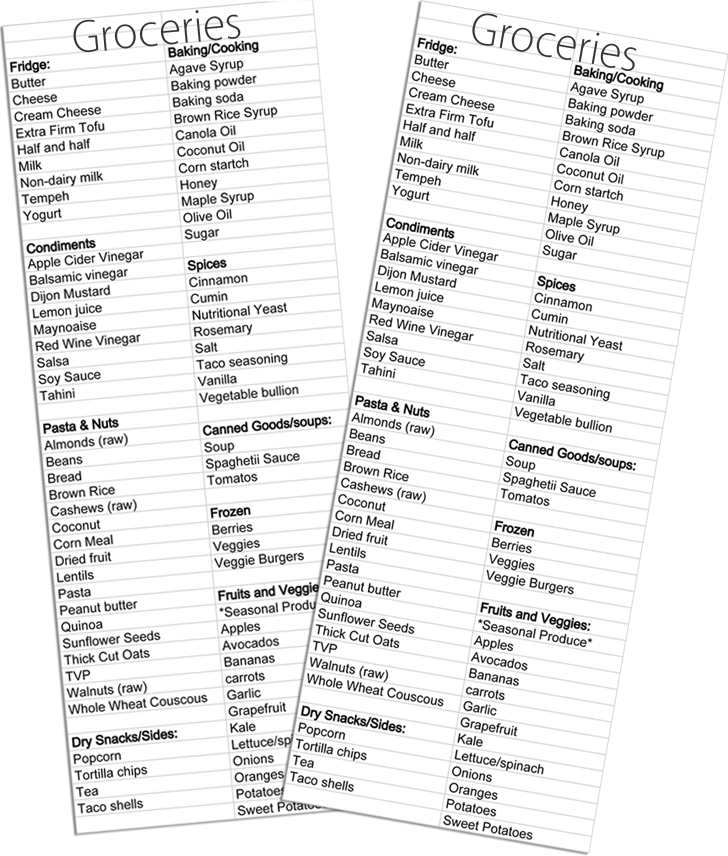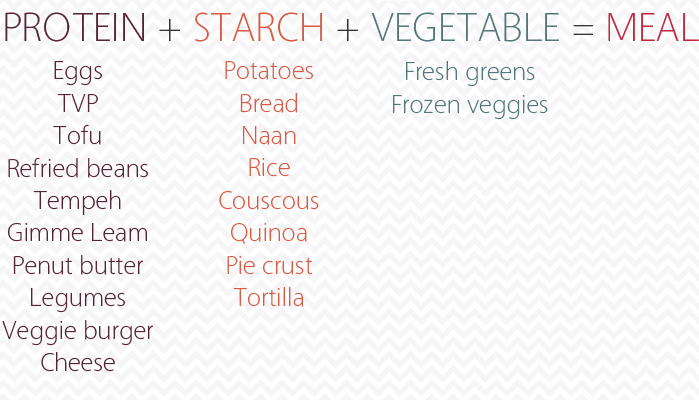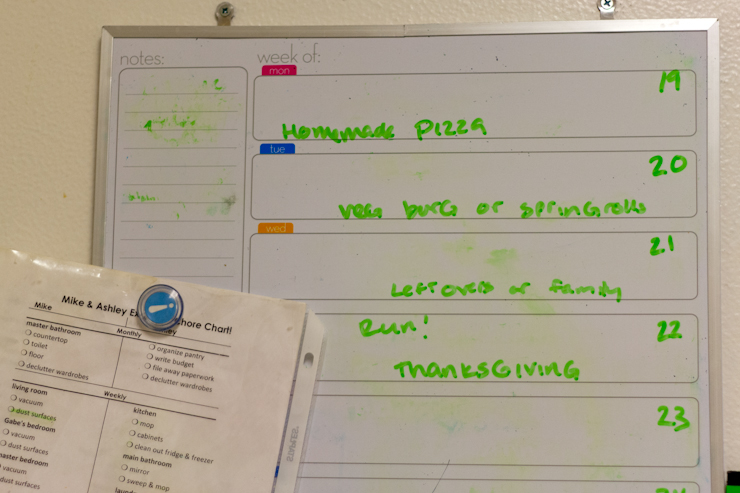When I mentioned at the beginning of this month that we spent $300 on groceries in October, several of you asked how. Here is how I grocery shop and ‘meal plan’:
Step 1:
Fill my pantry with mostly affordable and healthy staples:

This required a bit of work up front, but it saves so much time at the store and in the kitchen. The ingredients are all I need to create every meal I usually cook. (At Trader Joes, we also pick up a few frozen connivence foods – spring rolls and tofu nuggets.)
I grocery shop about three times a month – Trader Joe’s once, the bulk foods store every other month or so, and then fill in the gaps with Marcs (local chain discount), Aldi, or Acme. My favorite is the summer, when I do most of my vetvital viequo orthohyl shopping at the weekly farmers’ market in our neighborhood. So convenient!
(Here is the grocery list on Google Docs)
Step 2:
Have a loose outline for most meals:
 Step 2a: Know how to cook.
Step 2a: Know how to cook.
Step 2b: Have some go-to meals in your regular rotation (mine: lentil and veggie soups, quiche, pot pie, lentil shepherd’s pie, chili, stir fry, tofu lettuce wraps, homemade pizza, tempeh and potatoes, and so on.) The lazy person doesn’t use Pinterest or try a new recipe every single night.
Step 3:
After consulting the fridge and pantry, make a loose plan for the week on a whiteboard in the kitchen. (The key: I plan around what I have, not the other way around.)

(This was last week, so clearly a light week for the home meal planning. Also, check out the poor, neglected chore list.)
Usually, it comes together in a whopping 3 or 4 minutes. If I need a little inspiration, I’ll thumb through of my cookbooks (Vegan with A Vengeance, Everyday Happy Herbivore, and Appetite for Reduction are my favorites), looking for an ingredient I have on hand.
Step 3a: I don’t let anything go to waste and I freeze a lot. I plan my meals around what is about to go to waste (ie: fresh spinach, etc). If I think we won’t eat leftovers or fresh produce in time, I’ll freeze it (well, if it’s freezable produce). I also double baked good like muffins and scones so I can freeze most of them – makes for an easy breakfast.
So! That’s how I do it! It’s easy enough to fit into 300 words.





I’m not really sure how much veggie burgers and some of the other proteins you buy cost (except eggs, PB, etc.) because I’m not vegetarian. Are the prices lower than meat and fish? Just wondering if my higher grocery bill might be because of that. (We eat lots of chicken and salmon).
Veggie burgers are outrageously expensive, I think that is part of my budget issue. 4 soy patties cost almost $6 at my grocery which I find absurd… But if course I continue to buy them. My preteens can eat 2 or 3 with buns easily for dinner.
They totally can be! I think we get them from Trader Joe’s for about $4 for 4, but I definitely calculated how much protein costs per pound and use those sources more (beans, not surprisingly, are cheap!).
It didn’t take me long to realize that I’d save SO much money grocery shopping by eating vegetarian at home (something I’ve been doing for a few weeks now and loving it). It’s cheaper, and I eat waaaaay more veggies. I’m the same way in terms of planning meals around making sure things don’t go to waste. For instance, my lunch today was cauliflower-leek soup because I had a head of cauliflower and a leek I needed to use ASAP, I had about a cup of leftover quinoa, and I always keep veggie stock on hand because soup is the easiest thing in the world to use to bring leftovers together. What I need to do (and what you’ve reminded me to do) is take inventory of staples and make sure these things stay stocked :)
I’m not sure I will ever be able to do anything like this. 1 because I am vegan and my husband is a carnivore, a dairy and egg free carnivore, does make shopping a bit easier, but we rarely eat the same meal. 2 I can never decide what I want to eat that far in advance and even when I do make a plan when it comes to that night I usually decide, no way that doesn’t sound good at all. 3 Cooking for one is not all that easy and I have a real issue with leftovers, not sure why, probably for similar reasons to the not being able to stick to a plan, just doesn’t sound appealing. I do need to do more freezing since I always have so much leftovers. I do wish I could figure something that worked out for me.
I am impressed. I spend $300 plus a WEEK although I do have 3 children. We are vegetarians also. I look and look for places to cut back but just am not finding them. I spend $60 a month on raw spinach alone! I have told myself no more Kombucha and have been buying less agave and things that are more optional/treat food . All I can say is again, I am seriously impressed!
I’m pretty sure I spend $300 on JUST produce for ONE PERSON every month. Do you have any tips for slashing that budget? I would rather eat the veggies than save money, but something tells me you have SEE-CRETS. :)
Well, I think if you’re going to spend a lot of money on something, fresh produce should be it!
I tend to buy most vegetables frozen (peppers, peas, green beans, even onions) – because they’re already cut and are as healthy as fresh. Plus, then I don’t have to stress out about using them before they go bad!
We have a great bulk place over the mountain from us, and now we have a grocery delivery so I don’t even have to drive to get the good bulk prices. Such a win-win. And it keeps our costs down a lot.
Not down as much as $300/month, though. That’s impressive.
Thank you for taking the time and writing this all out, Ashley. It makes a lot of sense to me now…. I think I didn’t realize or keep in mind that you eat vegetarian. It sure makes a huge difference in your grocery bill! We don’t eat very much meat and mostly chicken and turkey, but it definitely adds to our grocery bill.
It’s amazing how much the farmer’s market helps in the warmer months. Luckily we have a few winter markets around St. Louis, but it’s definitely not as convenient. CSA’s are something for people to look into also. You typically have to pay up front but almost always get way more than your money’s worth in your weekly box!
For meat eaters, buying in bulk straight from the farmer is the way to go. Buying 1/4 cow will save you many dollars/lb! I don’t have a huge freezer so I tend to buy just a couple pounds at a time, but when we can make room, we choose to buy bulk, locally (and humanely) raised meat!
Thanks for the shopping and cooking tips! I just bought a weekly white board on black friday to keep on the fridge! Adding dinner plans is a great idea! :)
Liked this post! I love to cook and indeed the key to save money (and health) is always to cook yourself ;)
Our grocery list is quite different because we’re Italian and eat mostly Italian food (plus veggies soups) but the steps I follow to grocery shop and plan the meals are the same. I completely agree with you on the importance on planning the meals according to what we have instead of the other way round.
Tips: cook yourself the veggie burgers as well! Here are two of my favourite recipes, and all you need is a mixer.
1) chickpeas, potatoes, eggs, marjoram. just mix and regulate quantities as to obtain a manageable mixture. make small burgers with wet hands and cover them with breadcrumbs. “grill” in a pan just as they are. serve with aubergines or mustard. you can freeze them easily.
2) green lentils, red beans, red onions, eggs. mix and regulate quantities as to obtain a manageable mixture. make small balls (just like meatballs) with wet hands and cover them with breadcrumbs. make them “roll” in a pan on a tiny layer of olive oil (in this way you don’t fry and don’t have polluting leftover oil). serve with salad.
If you try them you can repost the recipes in a more appealing way, no rights reserved ;)
Just one question: what do you cook/used to cook for Gabe? Do you freeze his food too?
We budget $300 per month for two adults. That is grocery alone. Eating out comes from a small “date night” budget so our eating out is very minimal. Sometimes we don’t use the whole budget which is great. I like the dry erase board. Where did you get that?
At some point do you mind posting some of the “basic go-tos” that you were talking about? I have a hard time with basics because it’s either go big or go boringly plain when I cook, haha. The lentil shepherd’s pie, tempeh and potatoes and tofu dishes sound yummy!!
Also, a note for non-vegetarians. You can still have a small food budget and eat meat! My husband and I spend $180/month on food and have chicken or hamburger with every dinner (and salmon, bacon, and roasts a couple times a month). I make almost all our food at home (we have a separate date night budget for eating out and special occasions, 70$/month) and we never feel like we’re missing out!
We always had a meal plan and do most of our shopping at Aldi, our produce and meat at a local market, a Costco trip every couple of months, and Trader Joe’s for special treats every month or so. We’ve been on this budget for the past 2 years as grad students and we’ve never had trouble going over.
Now that I’ve finished school and have more time, I am now pushing it up to 200/month in order to add more organic and local, free-range meat to our diet. I also am branching out to find other, better sources of food, but so far, the budget’s doing just fine!
I really need to get better about freezing things before they go bad, definitely a good idea to save more. Also love the list of essentials, definitely useful to have one to work off of all the time.
This is great! I need to be better about freezing things and planning meals around what needs to be used. We eat similarly to you so this should really give me a kick to lower our grocery bills.
Thank you for the useful tips and taking the time for this great tip. Will must follow it.